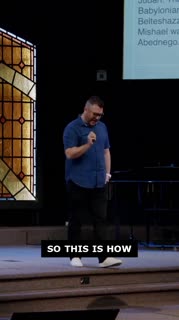Faithful Living as Exiles: Lessons from Daniel
Devotional
Sermon Summary
Bible Study Guide
Sermon Clips
1) "Now I want you to imagine that somehow through no choice or fault of your own, you are removed from this country and put into a foreign country that has a very different political system. a very different culture, a very different religious system, a very different social ethic. Like, everything is different. Not just different, it's like opposite of what you are used to and what you believe and are comfortable with. I want you to imagine that not only are you in this foreign country, but again, through no choice of your own, through no fault of your own, you are actually forced to work for that government and that culture and that system. How are you, as a God -fearing Jesus follower, going to navigate that challenge?" [38:15] (52 seconds)
2) "Well, the good news is this is not a new problem. If you have read God's Word, the Bible, a lot of it, like I didn't take the time to like figure out what percentage, but a lot of it is written to people who believe in God and who are not in power. In fact, they are under some other power that is not of God. A lot of the Bible is written to basically the concept of people in exile. Exile might be in a foreign land like Assyria or Nineveh, which is Assyria, or Babylon or Persia, or it could be exile in your own land, think like Jesus and the disciples, where Rome is taking over." [42:46] (37 seconds)
3) "I have been thinking about Daniel for a while now, and just his situation and his story, and I want you to think about Daniel for a while now, and trying to figure out, like, how did he go from being a slave captive with no rights to having such power and privilege? Like, obviously, he stayed true to himself because he's in the Bible. He stayed true to his beliefs because he's in the Bible, and he's listed as a hero of the faith. And obviously, he played the game, and he played politics, and he got along. Somehow, he did both of those. How did he do that?" [44:47] (36 seconds)
4) "So this is how our book starts. A foreign king, the enemy, the bad guys, and if you followed us through our Minor Prophets series, when God says, I'm going to use Babylon, to correct you, it's like, whoa, whoa, I know we're bad, but like, them? They're way worse. And on a scale of good to evil, they're exponentially more evil than Israel and Judah, even on their bad days. And God allows, according to Daniel, God allows Nebuchadnezzar to come, besiege the city, take over, take the best of the best, including the stuff, and take them to Babylon and for his own good." [48:51] (38 seconds)
5) "The good news is that the exile often tends to infuse communities with new creative energy. that rises to meet the challenges of the new cultural circumstances. Imagine a community as in a church. Imagine a community of people who knew how to wisely navigate their daily lives even when they were not in control. Imagine a community that cared for the people who were in control, not as a manipulation tactic, but as caring for the image of God in someone. Imagine a community who remembered, believed, and lived as if they really believed that God is in control of who is in control." [01:08:54] (38 seconds)
6) "Remember that Daniel, Azariah, Mishael, and Hananiah can become Shadrach, Meshach, Abednego, and Belteshazzar and still have influence and still wisely navigate no -win situations and still honor the image of God in those around them and in so doing, honor their God. And that thousands of years later, because of it, we can be learning from it." [01:10:05] (27 seconds)
Ask a question about this sermon
2) "Well, the good news is this is not a new problem. If you have read God's Word, the Bible, a lot of it, like I didn't take the time to like figure out what percentage, but a lot of it is written to people who believe in God and who are not in power. In fact, they are under some other power that is not of God. A lot of the Bible is written to basically the concept of people in exile. Exile might be in a foreign land like Assyria or Nineveh, which is Assyria, or Babylon or Persia, or it could be exile in your own land, think like Jesus and the disciples, where Rome is taking over." [42:46] (37 seconds)
3) "I have been thinking about Daniel for a while now, and just his situation and his story, and I want you to think about Daniel for a while now, and trying to figure out, like, how did he go from being a slave captive with no rights to having such power and privilege? Like, obviously, he stayed true to himself because he's in the Bible. He stayed true to his beliefs because he's in the Bible, and he's listed as a hero of the faith. And obviously, he played the game, and he played politics, and he got along. Somehow, he did both of those. How did he do that?" [44:47] (36 seconds)
4) "So this is how our book starts. A foreign king, the enemy, the bad guys, and if you followed us through our Minor Prophets series, when God says, I'm going to use Babylon, to correct you, it's like, whoa, whoa, I know we're bad, but like, them? They're way worse. And on a scale of good to evil, they're exponentially more evil than Israel and Judah, even on their bad days. And God allows, according to Daniel, God allows Nebuchadnezzar to come, besiege the city, take over, take the best of the best, including the stuff, and take them to Babylon and for his own good." [48:51] (38 seconds)
5) "The good news is that the exile often tends to infuse communities with new creative energy. that rises to meet the challenges of the new cultural circumstances. Imagine a community as in a church. Imagine a community of people who knew how to wisely navigate their daily lives even when they were not in control. Imagine a community that cared for the people who were in control, not as a manipulation tactic, but as caring for the image of God in someone. Imagine a community who remembered, believed, and lived as if they really believed that God is in control of who is in control." [01:08:54] (38 seconds)
6) "Remember that Daniel, Azariah, Mishael, and Hananiah can become Shadrach, Meshach, Abednego, and Belteshazzar and still have influence and still wisely navigate no -win situations and still honor the image of God in those around them and in so doing, honor their God. And that thousands of years later, because of it, we can be learning from it." [01:10:05] (27 seconds)






